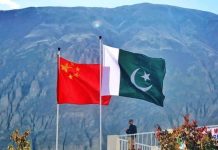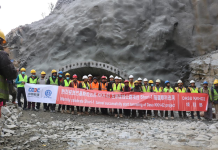BEIJING: In a resounding endorsement of the Belt and Road Initiative (BRI), the Chairman of the Senate of Pakistan, Muhammad Sadiq Sanjrani, has lauded the project’s far-reaching influence on regional integration and connectivity.
His recent statement marks a significant recognition of the initiative’s transformative role in fostering closer ties and bolstering infrastructure development within the region, Gwadar Pro reported on Tuesday.
At the International Symposium commemorating the 10th Anniversary of Amity, Sincerity, Mutual Benefit, and Inclusiveness in Neighborhood Diplomacy on Tuesday in Beijing, Chairman of the Senate of Pakistan, Muhammad Sadiq Sanjrani, addressed a diverse audience of global leaders and distinguished delegates.
In his speech, Chairman Sanjrani highlighted various challenges that the world is facing, ranging from geopolitical tensions to non-traditional threats like pandemics and climate change.
He stressed the need for dialogue-based conflict resolution, urging the international community to unite against violence and war.
Acknowledging the significance of the Belt and Road Initiative (BRI) and the China-Pakistan Economic Corridor (CPEC), Chairman Sanjrani praised the transformative impact of these projects on Pakistan’s economic landscape.
He emphasized the importance of collaboration under the Global Development Initiative and highlighted the role of the Global Security and Global Civilization Initiatives in fostering international peace and security.
The Chairman concluded his speech by calling for regional cooperation and a shared commitment to unity, sincerity, and mutual respect. He expressed his hope for fruitful deliberations and insightful discussions at the symposium, underscoring the importance of fostering a brighter and more harmonious future for all nations.
The symposium continues with a spirit of collaboration and engagement, guided by the principles of amity, sincerity, mutual benefit, and inclusiveness, aiming to pave the way for a more peaceful and prosperous world. –INP






